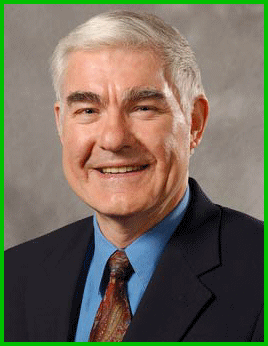

(Martin) Raymond Flannery was born on 8th January 1941 in Claudy, County Derry; the son of James and Bridget (née Lohan) Flannery of Tubbercurry and Roscommon respectively. His parents were schoolteachers at a two teacher school at Athnahoney, near Claudy, and had seven children. The family moved to Derry City in 1945.
Ray was educated at St. Columb's College (1952-1958), and earned both his B.Sc., (first class honors degree in mathematics, 1961), and his Ph.D. (theoretical physics, 1964) in Queen's University of Belfast. He has held faculty positions at Queen's University (1964-66), Georgia Institute of Technology (1967-68), and Harvard University (1968-71). He was appointed Associate Professor at the School of Physics, Georgia Institute of Technology in 1971, then Professor in 1974 and Regents' Professor in 1993. He was a visiting Fellow at the Joint Institute for Laboratory Astrophysics at Boulder, Colorado in 1977, Fellow at the Institute for Theoretical Atomic and Molecular Physics, Harvard in both 1993 and 2002 and a Guest Professor at the University of Innsbruck in 1996. He is a Fellow (1979) of the American Physical Society, a Fellow (1980, 2000) and Chartered Physicist (2000) of the Institute of Physics, London and an Honorary Member (1997) of the Royal Irish Academy.
His area of expertise is in the theory of atomic and molecular collision processes, in general, and on recombination processes at thermal and ultra cold energies, in particular. He has published over 160 refereed papers and review articles in atomic and molecular physics journals, with 66 as sole author. He has presented over 44 invited papers at national and international scientific conferences and many invited colloquia at Universities. He delivered the Commencement Addresses at Graduation '95 of Georgia Institute of Technology and at Graduation '98 of Queen's University of Belfast. He served (1978-85) on the Editorial Board of the International Journal of Quantum Chemistry, served (1981-3, 1986-88) on the Executive Board of the Gaseous Electronics Conference and was appointed (1994-2000) a Divisional Associate Editor of The Physical Review Letters. He is currently a member of the Editorial Board of the Atomic and Molecular Physics Handbook (Springer Press) and an Editor of the Springer Book Series on Atomic, Optical and Plasma Physics.
He was awarded various Prizes from the Georgia Tech Chapter of Sigma-Xi, "for best paper" in 1974, "for best Ph. D thesis advisor and outstanding research" in 1975 and in 2001, and "for sustained research" in 1992. He received the Distinguished Professor Award from Georgia Institute of Technology in 1995 "in recognition of his sustained scholarship, leadership, achievement and excellence in teaching, research and service."
He was elected in 1997 an Honorary Member of the Royal Irish Academy, one of thirty honorary members worldwide in the Section of Science, in recognition of his distinguished services in the Section of Science. He is the recipient of the 1998 Allis Prize, awarded by the American Physical Society for advancing the understanding of recombination processes; in particular for developing a microscopic theory of three-body ionic recombination; and for his novel applications of classical and quantum mechanical methods to the dynamics of atomic, molecular and ionic systems." The Queen's University of Belfast awarded him in 1998, the degree of Doctor of Science, D.Sc. degree (honoris causa) for "his distinction as a scientist." He is the recipient of the 2001 award of "Alumnus Illustrissimus" of St. Columb’s College, Derry. He is the recipient of the 2002 Sir David Bates Prize awarded by the UK Institute of Physics (Division of Atomic, Molecular, Optical and Plasma Physics), London, for “ his distinguished contributions to the field of theoretical atomic physics and, in particular, for his studies of recombination processes with applications to astrophysics and plasma physics.” He is also the recipient of the 2002 Jesse W. Beams Award of the Southeastern Section of the American Physical Society " for his pioneering, seminal, influential and enduring contributions to Atomic and Molecular Collision Physics."
His research focuses on recombination processes. In other words, he studies how electrons, ions and atoms move about, collide, and then combine to form new atoms and molecules. These are essential to understanding the ozone layer as well as planetary and stellar atmospheres. Recombination theory is also important in advanced technologies such as microelectronic circuitry and plasma processing of materials. Currently, Ray is working on a recombination process that he hopes will produce anti-matter at cryogenic temperatures (4 degrees Kelvin). Besides shedding light on origins of the universe and its subsequent evolution, this research might produce a future source of rocket fuel required for interplanetary travel.
Raymond died on 2nd May 2013.[his portrait is illustrated above; courtesy of Georgia Institute of Technology]